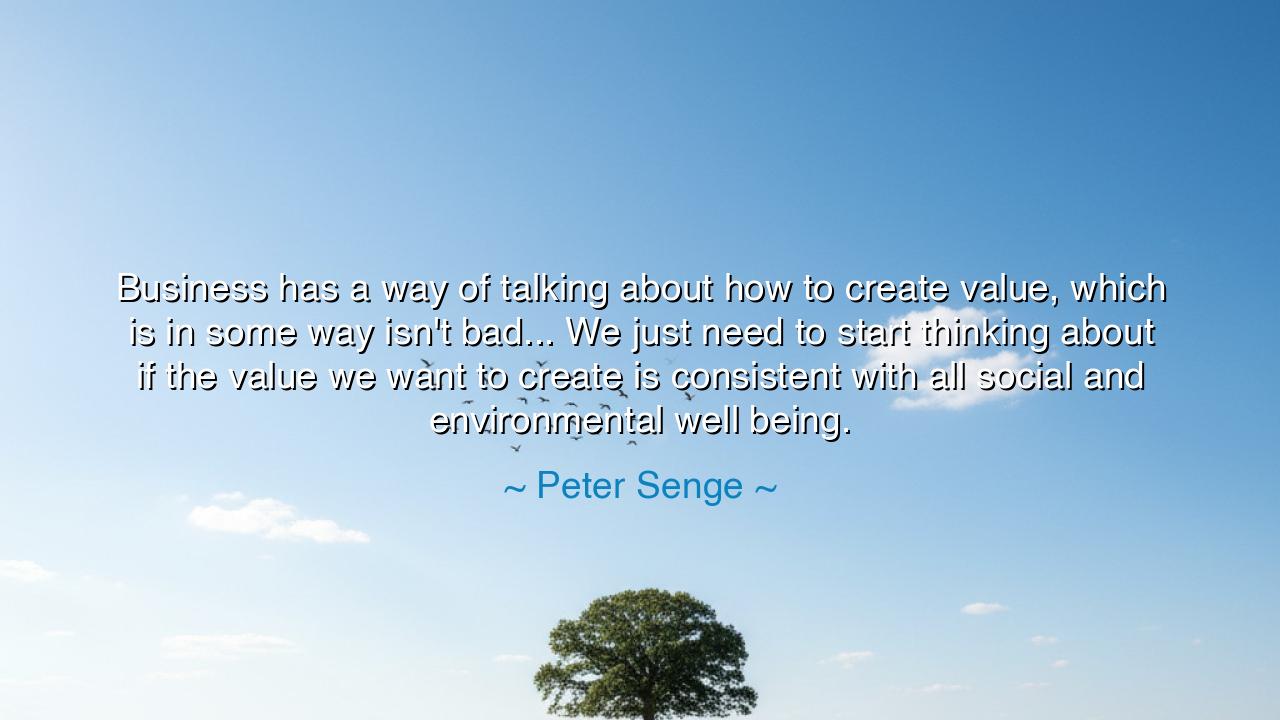
Business has a way of talking about how to create value, which is
Business has a way of talking about how to create value, which is in some way isn't bad... We just need to start thinking about if the value we want to create is consistent with all social and environmental well being.






In the vast marketplace of human endeavor, Peter Senge reminds us of a truth that transcends mere profit: “Business has a way of talking about how to create value, which in some way isn’t bad... We just need to start thinking about if the value we want to create is consistent with all social and environmental well-being.” These words are not only a meditation on commerce—they are a call to conscience. For though the pursuit of value lies at the heart of trade and enterprise, the nature of that value determines whether it serves humanity or consumes it.
In the ancient world, merchants and artisans understood this balance intuitively. The Phoenicians, whose ships crossed every sea, thrived not merely by accumulating wealth, but by exchanging culture, language, and knowledge among nations. They understood that commerce, when guided by wisdom, unites peoples rather than divides them. Yet when greed replaces harmony, value becomes hollow, measured in coins that corrode rather than communities that flourish. Senge’s teaching recalls that lesson of antiquity: business must serve life, not diminish it.
Consider the Industrial Revolution, a time of both triumph and tragedy. Human ingenuity forged machines that expanded production and prosperity—but the air blackened, rivers ran with waste, and millions toiled in misery. The factories of Manchester, while symbols of progress, also became monuments to imbalance, where economic growth advanced at the cost of human and environmental well-being. History’s lesson is clear: when the creation of value is divorced from compassion and foresight, it breeds suffering, not progress.
In modern times, we witness both the peril and promise of this same principle. The world’s most visionary companies—those that invest in sustainability, renewable energy, and fair labor—prove that profit and planet need not stand as enemies. Just as ancient rulers inscribed laws to protect the fields and forests that sustained their kingdoms, so too must modern enterprises align their values with the enduring good of the earth. The wise leader understands that social and environmental well-being are not hindrances to success, but the foundation of enduring prosperity.
Senge’s reflection calls us to see business as a living organism—one that breathes within the greater body of society and nature. To create value that harms the planet is to poison the very source of one’s own vitality. The soil that yields grain, the water that sustains life, and the workers who labor—all are threads in the same fabric. When one is torn, the whole unravels. Thus, the ancient principle of balance must guide the modern enterprise: the just ruler, the wise merchant, and the ethical innovator each know that lasting success demands harmony with the world that sustains it.
We must, then, redefine what we mean by value. It cannot be measured only in revenue or market share, but in the well-being of communities, the health of ecosystems, and the dignity of work. The civilizations that endured—Egypt, China, the Roman Republic in its golden age—were those that placed stewardship above consumption, and service above excess. The same truth holds today: a company that honors its workers, preserves its environment, and contributes to society will outlast one that exploits for short-term gain.
Practically, Senge’s wisdom invites every individual and institution to reflection. Before acting, ask: does this decision nurture or deplete? Does it build value that uplifts all, or wealth that isolates a few? Let business leaders invest in renewable technologies, fair trade, and ethical design. Let citizens support enterprises that act as guardians of the earth. In every choice lies a ripple of consequence; in every act of integrity, a step toward harmony.
Thus, Peter Senge’s words echo as a modern scripture of stewardship: “We must ensure the value we create aligns with social and environmental well-being.” Let this teaching endure beyond boardrooms and markets—let it guide all who labor, innovate, and lead. For when commerce and conscience walk together, prosperity becomes not a fleeting victory, but a legacy worthy of the generations yet unborn.






AAdministratorAdministrator
Welcome, honored guests. Please leave a comment, we will respond soon